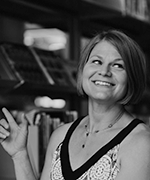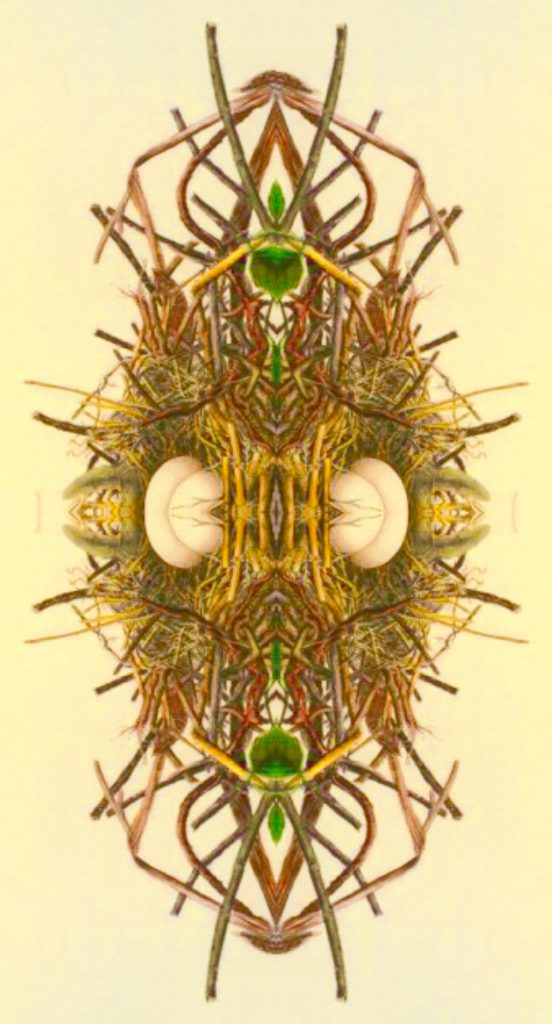By Christine Stewart-Nuñez
Affection
“Now be still. I’ve got lipstick,” I say. My grandfather reclines in his La-Z-Boy and stares beyond me at the television. I position my hand near his jaw and his breath, which smells like Carnation condensed milk and coffee, warms my fingers. As I reach over for a tissue to blot, he speaks.
“A chicken bit my chin right here.” He points to his dimple. “Took a whole chunk off.”
“Bull,” I reply, tempted to add the second half of the word he’d planted into my vocabulary. Really, I believe him.
Chewing on the end of my blonde braid, I blend rouge into his stubbled cheeks. “We have the same blue eyes,” I say, squinting to inspect my work. We both know that isn’t true; he’s my dad’s stepfather.
His silver-streaked black hair rolls up easily in Grandma’s pink, plastic curlers because he only bathes once a week. I brush dandruff from his shoulders, smelling his age and sweat and body oils. Then I hold up a mirror: “Ta da!” He pretends to be startled, then smiles.
As I’m cleaning up, Grandpa reaches into his pocket for a cigarette. Lighting the Pall Mall, he barks, “Chrissy, get me a beer” from the other side of his red lips. In the ten steps from refrigerator to chair, I shake the Pabst Blue Ribbon. He acts surprised by the burst as he cracks it open, even though it’s our ritual. Makeover misted, we laugh as rivulets of beer spill over the side of the can. Minutes pass as we share the quiet space, the television show’s laugh track ebbing and flowing, anchoring our thoughts.
Deep Understanding
Johan and I spoon in his sleeping bag on the open deck of a ferry from Santorini to Athens. I’d been shaking sand off my sandals when we made eye contact on Samos five days ago. After he opened a guidebook, I struck up a conversation. We walked into town, rented a scooter, and spent an afternoon admiring the markets, stucco houses, and whitewashed churches.
“I’ve never seen this,” I’d said at one point, slipping off the scooter. “The way groves of trees end at small cliffs…”
“Above a turquoise sea,” he said, finishing my sentence. Shoulder to shoulder, we listened to wind shaking leaves. That night, while munching on gyros, we braided our travel itineraries.
This ferry will be our last few hours together, so it feels right to review.
“Weren’t those charcoal grains of sand on Santorini amazing?” I ask. We had sipped cocktails on a black-sand beach discussing the island’s ancient ruins, the Minoan-Crete civilization, and the lost city of Atlantis.
“Yes,” Johan says, his hand moving across my arm to zip up the sleeping bag. “Volcanic residue the texture of table salt.”
“From the mountain the beaches looked like roads,” I added.
The sand in Ios, where we’d been just three days before, was the size of mustard seeds. There, I placed the pink, yellow, and white grains on my fingertip for Johan to study. He brought my hand up to eye level and turned his head. “Translucent,” he said. From a few steps away it must’ve looked as if we were about to kiss. I opened my fingers, let the sand slide through, and asked about South African beaches from my towel, parallel to his. We talked for hours, that night culminating in a bar on the “Home of Homer,” where we tried to channel the Bard.
“Can you remember any lines?” he asked, challenging me, an English teacher.
“Two friends, two bodies, with one soul inspired,” I mustered. Johan smiled, hand wrapped around a cold beer.
“I bet Homer preferred wine: ‘Wine gives strength to weary men,’” he paused. “You tended bar once?”
“I enjoyed mixing liquor and word play,” I said. “Especially sexual innuendo drinks: Buttery Nipple, Between the Sheets, Sex on the Beach.” That night ended dancing on the bar-turned-disco.
When the cold breeze picks up across the water, Johan and I cleave to each other. This is the closest our bodies have been. Tomorrow we will part at the bus station without a kiss, but now, as he pulls me close, I can feel the grains of sand, released from the folds of the bag, on his skin. We whisper on into the night, anticipating each other’s every word.
Private
Aurora, Prairie, Airline, Meredith. At eight years old I wrote the names of my neighborhood’s streets on curling birch bark with a felt-tip pen. I admired the letters’ shapes: I resembled a tree—slim yet solid and as a vowel quite generative, an anchor for consonants; M became tree trunks in a forest; the uppercase Y reached like branches; capital A looked like the spade I used to dig a hole near the birch where I buried my scrolls after rolling and binding them with string.
When I planted my words, I imagined another girl—a sister in love with language —would find them and speak them aloud. The a’s in aurora would pin down the purr-like roar. She’d conjure the grass-waves with the last syllable of prairie, and she’d marry the logical precision of geometry with the balloon-filled promise in airline. And Meredith, a name of substance with a strange and splendid drop—would my imagined sister think the word felt as gritty and rich in her mouth as it did in mine, so much like the soil in which we dug?
A sliver of me existed in the geography of roads running east and west and in the fruit of these words’ meanings. From the Aurora I knew as a child—the princess of Sleeping Beauty—leapt the northern lights, the Roman goddess of dawn, an asteroid. Prairie conjured more than the title of Laura Ingalls Wilder books; it built the horizon of my birth, a landscape to which I’d return. Airline suggested an escape route, a way to move from the imagination to the real. And Meredith—no one I knew yet—became a character who serves an old queen, an entrepreneur who speaks French and Japanese, a paleontologist who discovers a new species of dinosaur.
I don’t remember if it was before or after the planting of words that I dusted off my mother’s high school Spanish book to teach myself a new language, nor do I recall the year I read the “A” encyclopedia cover to cover. Did these words sprout after I read the eight-hundred paged World’s Best Fairy Tales? Chronology’s importance evaporates when the smell of words—dirt and dusty paper—rise from concrete streets after a summer rain.
Sexual
With the water of the hot tub so warm, I don’t know where I begin. Rain blurs the order of things; conversations dissolve. I pour expensive beer for the box seat holders at the Des Moines Grand Prix and notice Ryan. Behind him, storm clouds gather and a few drops fall. The temp agency doesn’t call when the rivers are rising. I have time but not money. When we need to eat, we talk over lobster bisque, salmon sautéed in butter. Once, after he drops me off at home, we talk all night; it rains five inches on both sides of town. Once, an Irish wolfhound meets me at the door of his dad’s house. I shake water off my feet. We watch Casablanca while a sluice cascades down windows. Rain bounces up from the deck of his lush backyard. Puddles grow into pools. Lightening pulls us into blankets of steam. I feel thunder’s vibrations ripple out from the small of my back.
Comfort
“In what dress did you feel the most beautiful?” I ask the empty bedroom as I lift out cherry-red silk and black taffeta gowns off the rack. Images of my mother-in-law, Millie, wearing them materialize before shifting to stills of a yesterday’s events: the hospice nurse closing Millie’s eyes, death returning color to her face.
I ooh and ahh at each dress as I’m sure Millie did, caressing the fabric and inspecting for rips or stains. “I’ve only seen you dressed in white in your wedding photos,” I say, admiring a sequined dress. I can almost hear her laughing. The price tag, still attached, reveals a bargain. I’m five inches taller than Millie and a size eight on a good day, so when sizes zero, two, four, and six give way to a purple strapless in size ten, I try it on. I wiggle out of my yoga pants, slipping the satin over my head. Rosettes line the curved bodice. The dress swishes around my ankles.
Millie and I “shopped” together for the first time in this room shortly after her son and I married. Opening a chest of clothes, she asked: “Would any of these jeans fit you?” For an hour I pulled on and peeled off jeans as we chatted. Every once in awhile she snagged a blouse or sweater from her closet: “This would look good with those.” I felt closest to Millie when we shared a vocabulary of texture, color, and shape.
I turn to her purse rack. A black Prada tumbles off when I remove a brown crocodile skin handbag. I open it, hoping to find a lipstick, fingernail file, or sales receipt. Nothing—no lint, stray pen marks, or forgotten pennies—not even in the black-beaded clutch. Under the rack, I find a cloth bag containing four Fendi purses, exactly the same style in black, chocolate brown, tan, and red. All pristine. My fingers crawl through drawers of scarves: wine-colored rayon, Indian silk with elephants, ochre and gold floral, variations of blue geometric designs. I sigh, wrapping two of them around my shoulders. I cocoon in memories and miss her.
Familiar
It’s two o’clock in the morning. Cars no longer rush by on Vine Street, speeding up as they head to the outskirts of town. No one stomps across the room in the apartment upstairs. In our world, my son and I are the only people awake. Lamplight falls across the bed, the glow throwing geometric shadows on the wall and elongating the lines of his crib. As I cradle his head in my arm and feel his warmth, we share the space of my body—his lip-lock around my nipple, the milk moving between us.
At only thirty hours old he summoned me. And now I’m stirred from the deepest dream by his sigh, his cries, the urgency of his hunger. With my breasts thick with milk, I apply my new language: sleep bra, nursing tee, football clutch, cross-cradle, architecture of the breast, express milk. In a few months he will knead my breasts with tiny fists as if they are loaves of dough, jerking his head back to coax a faster flow.
He calls up love from the marrow of my bones.
I doze. The blanket thrown over the tall-backed rocking chair makes a soft thud each time we tip back. He drifts off: suck, suck, pause; suck, suck, pause. I move him to my shoulder, pat him, and whisper in his ear, planting secrets he may recognize in the distant chapters of his life. Before I place him in the crib, I kiss his forehead; his breath smells yeasty and sweet. It flutters like rice paper, making the sound of “H.”

Christine Stewart-Nuñez is the author of The Poet & The Architect (2021), Untrussed (2016) and Bluewords Greening (2016) —winner of the 2018 Whirling Prize (literature of disability theme). Her debut prose collection, Chrysopoeia: Essays of Language, Love, and Place, was published by Stephen F. Austin State University Press in 2022. Her work has been the basis for international, cross-artistic collaborations with colleagues in music, dance, visual art, and architecture. Christine served as South Dakota’s poet laureate from 2019-2021. She teaches in the women’s and gender studies program at the University of Manitoba. christinestewartnunez.com

